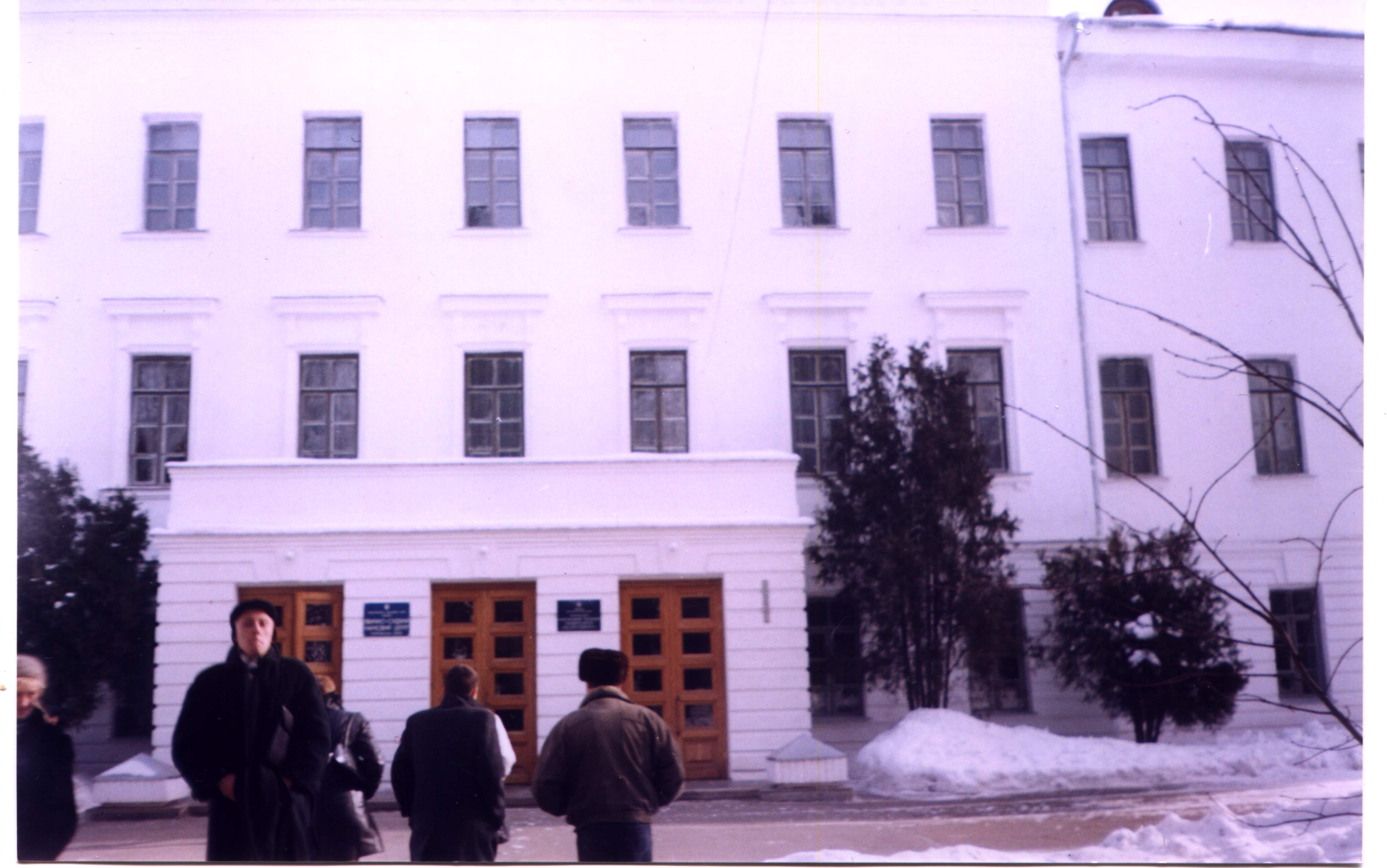
- •As you know, any higher educational institution has many students and professors. Listen to the limerick about a university student and decide whether he was brilliant or lazy.
- •It at last grew so small
- •Named in honour of yuriy kondratyuk
- •One more time and you’ll have it!
- •Tapescript 1
- •Tapescript 2
- •Tapescript 3
- •Tapescript 4
- •A number dictation
- •Swap your gapped sentences and in teams of three fill in the gaps.
- •Numbers and dates
- •Forms of the Infinitive
МІНІСТЕРСТВО ОСВІТИ І НАУКИ УКРАЇНИ
Полтавський національний технічний університет
імені Юрія Кондратюка
Кафедра іноземних мов
Іnstructions
for full-time first-year students
of all faculties and specialities.


Полтава 2003
Методичні вказівки для студентів 1 курсу груп із поглибленим вивченням англійської мови всіх факультетів та спеціальностей денної форми навчання (з дисципліни “Англійська мова”, тема “Наш університет” (I частина). – Полтава: ПолтНТУ, 2003. – 30 с.
Укладачі: І.О.Клімова, викладач;
М.К.Клімов, викладач
Рецензент: Ж.М.Сімачевська, канд. філол. наук, доцент
Відповідальний за випуск: завідувачка кафедри іноземних мов
Н.О.Демченко, канд. пед. наук, доцент
Затверджено радою університету
Протокол № від . . 2003 р.
Редактор Н.В.Жигилій
Коректор Н.О.Янкевич
Комп’ютерна верстка М.К.Клімов
Дані методичні вказівки призначені для студентів 1-го курсу всіх факультетів і спеціальностей денної форми навчання. Вони придатні для використання у режимі як для роботи в аудиторії, так і для самостійної роботи.
Мета методичних указівок – інтенсифікація вивчення англійської мови.
Методичні вказівки являють собою І частину вказівок на тему “Наш університет”, які складаються з 2-ох уроків із розрахунку на одне заняття кожен.
За структурою методичні вказівки становлять завдання для студентів та рекомендації до їх виконання для викладачів. У методичні вказівки входять: текст для читання; передтекстові і післятекстові вправи навчального характеру, які мають забезпечити практичне засвоєння матеріалу; граматична довідка до вживання кількісних простих та комплексних чисел у мовленні і на письмі; текст фонозапису й словник на майже 200 лексичних одиниць.
У цій роботі широко використовуються ігрові моменти всіх видів мовленнєвої діяльності, включаючи письмо (у вигляді кросвордів, ребусів). Види вправ досить різноманітні: це і підстановка, перехресний вибір, множинний вибір, переклад з англійської мови на українську і навпаки; виведення правил читання та інші, що передбачає розвиток фонетичних навичок у студентів, навичок читання, аудіювання, діалогічного й монологічного мовлення, розширення словникового запасу.
Усі вправи мають відповіді у вигляді фонозапису, що дає можливість проконтролювати правильність виконання завдань і звернути увагу на прогалини у засвоєнні поданого матеріалу. В кінці методичних указівок подаються словник класного вжитку (55 ЛО) та активний словник (135 ЛО), що дозволяє використовувати методичні вказівки на початковому, продовженому і підвищеному рівнях вивчення англійської мови.
Матеріали, що використані у методичних указівках, мають сприяти розвитку умінь та набутих навичок читання, аудіювання, письма, діалогічного й монологічного мовлення.
Ретельний відбір матеріалів, продумана методика дають змогу оптимально використовувати навчальний час і досить швидко досягти бажаних результатів. Усі матеріали взяті із сучасних оригінальних вітчизняних та зарубіжних друкованих джерел.
CONTENTS
STEP 1-------------------------------------------------------------------- 5
STEP 2-------------------------------------------------------------------- 12
TAPESCRIPT SECTION ---------------------------------------------- 20
CLASSROOM VOCABULARY-------------------------------------- 23
ACTIVE VOCABULARY---------------------------------------------- 25
REFERENCES ----------------------------------------------------------- 29
STEP 1
This time we are going to talk about our university.
In groups of three make as many words as you can out of university. The minimum number of letters in a word is three and the maximum is ten. The first one is done for you.
u
n
i
v
e
r
s
i
t
y




■unit
I![]() n
10-minutes time a representative of each group reads the first word
from their list. The class must listen carefully. If they have the
same word, they tick it off.
n
10-minutes time a representative of each group reads the first word
from their list. The class must listen carefully. If they have the
same word, they tick it off.
Once they have heard a word, they must not repeat it themselves. Each group gives one word till they are finished.
The group that gives the last word wins.
As you know, any higher educational institution has many students and professors. Listen to the limerick about a university student and decide whether he was brilliant or lazy.
T.1
T here
once was a student named Bessor,
here
once was a student named Bessor,
Whose knowledge grew lessor and lessor. 1
It at last grew so small
He knew nothing at all,
And today he’s a college professor!
Some of you may say he was lazy, the others may state that he was brilliant.
You have to prove your statements. Let’s do it in such a way.
T![]() he
students who think he was brilliant work in group
A,
and you are the group-mates of this student Bessor. You know him well
as a top student.
he
students who think he was brilliant work in group
A,
and you are the group-mates of this student Bessor. You know him well
as a top student.
The students who think he was lazy work in group B, and you are the former teachers of this student Bessor. You consider him lazy.
While attacking this problem make use of the following words and word-combinations:
afterwards in fact
to attend lectures (tutorials, seminars) it seems that
at the very beginning to know nothing at all
brilliant to lag behind the group
the course of studying lazy
an excellent student to learn a lot of new things
to graduate from the university to make good progress
to grow less and less a professor
in comparison with others to study hard
I n 5-minutes time a representative of each group, in turn, reports their evidence to the class. The class listens and notes down details to find out how many statements were similar to those in professor Bessor’s admission. Finally, ask which group had the most similar statements.
And now let’s listen to what professor Bessor himself is saying and see whose statements are closest.
T.2
The following Ukrainian key-phrases taken from his admission are given in a logical order.
In pairs find their English equivalents on the right and copy them into your copybooks.
■ 1. ні тямучий, ні лінивий - neither brilliant nor lazy
1. ні тямучий, ні лінивий |
-as most of you |
2. звичайний студент |
-as the proverb says |
3. як більшість із вас |
-average student |
4. я прагнув дізнатися |
-it’s never late to learn |
5. чим більше я вчився, тим більше усвідомлював |
-I was eager to learn |
6. існує багато того, чого я ще не знаю |
-live and learn |
7. кажучи правду |
-neither brilliant nor lazy |
8. щоб не показати своє незнання |
-never stopped learning |
9. перестав брати участь |
-not to show my ignorance |
10. залишався мовчазним |
-quit taking part |
11. ніколи не переставав вчитися |
-remained silent |
12. підбадьорити |
-saying the truth |
13. тих, хто втратив віру в себе |
-the more I studied, the more I realized |
14. вчитися ніколи не пізно |
-there are so many things I don’t know yet |
15. вік живи – вік учись |
-those who lost the confi- dence |
16. як говориться в прислів’ї |
-to encourage |
Make sure that you translate them correctly and check yourselves.
T .3
.3

What a Good Job!
Now each of you is professor Bessor.
Tell your story but do it in this way:
e ach student in turn says sentence by sentence until the story is finished. Listen to each other attentively and follow the story so as not to repeat what has already been said.
At home you are to write a composition in which you retell professor Bessor’s story as his close friend. Do it on a separate sheet of paper in 100 words. The sample beginning of your composition is: Professor Bessor is my close friend. I have known him since…
Now you have a chance to learn more about our university.
Read the text in low voice. Your time limit is 5 min. Don’t worry about the unfamiliar words to you.
POLTAVA NATIONAL TECHNICAL UNIVERSITY
